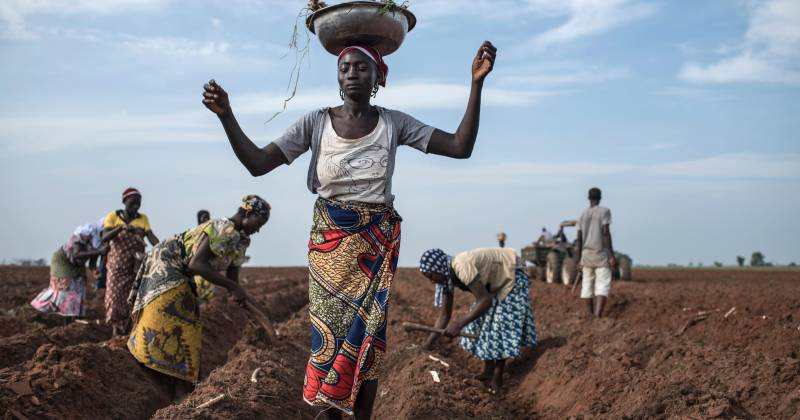Building resilient communities that can endure and adapt to the effects of climate change should begin with the efforts of women like Sarah Gyamfuah, a young single mother in Ghana who is challenging traditional gender roles. Ms Gyamfuah is contributing to the sustainability of her community while also earning essential skills and experience for her personal development as a team leader on a bridge construction project directing scores of people.
Ms Gyamfuah and other women from Ejura, a suburb of the Sekyere Edumase Municipal Assembly in the Ashanti Region, are participating in a European Union-funded Cash for Work action as part of the Boosting Green Employment and Enterprise Opportunities in Ghana, or GrEEn project, with technical assistance from the UN Capital Development Fund.
Serving as the community facilitator on this project was a significant challenge for me, as I had to manage people who were many years my senior. When there were disagreements, I was the one entrusted with resolving them. I had to guarantee that people executed the duties they were assigned to, even though some individuals wanted to earn their salaries without actually working," said Ms Gyamfuah, a 22-year-old single mother of a young son.
"This has been a humbling experience for me." I never imagined I'd be in such a position of leadership, and the skills I've gained along the road have been invaluable. "I feel more secure today and believe I can accomplish more in life," Ms Gyamfuah continued.
The GrEEn Project aims to increase economic and employment prospects for youth, women, and returning migrants in Ghana's Ashanti and Western Regions by promoting and supporting sustainable, green enterprises. GrEEN's goal is to employ grants and technical assistance to construct local financial ecosystems that facilitate the development of Micro, Small, and Medium Enterprises (MSMEs) and enable local economies to shift to green and climate resilient development. GrEEn is carried out by the European Union's Emergency Trust Fund for Africa.
Women constitute about half of Ghana's total population, and while substantial progress has been made in decreasing the gender gap in recent years, inequities persist. Women, for example, are more likely to work in low-wage jobs.
In Ghana, inequalities between men and women can be traced in part to cultural traditions and norms that continue to limit women's roles in the workplace and consign women to certain jobs. The tendency is progressively altering, and more women are performing occupations that were previously regarded to be exclusively male.
Ms Gyamfuah and others, together with other women and men from her community, contributed low-skilled physical labor for the construction of a flood-resistant bridge over a stream in her community. For many Ghanaians, the idea of women performing hard labor on a building job is unheard of. This is a position that is solely designated for men, who are commonly referred to as the "muscle men.
Ms Gyamfuah went one step further to debunk the assumption that men and women are unequal, taking on the role of timekeeper and community facilitator for the construction project in her town. In effect, she was the construction foreman, supervising over 80 individuals, the majority of whom were far older than her. It is considered unacceptable for a young individual to give directions to older people in Ghana, and it is even more taboo for a younger girl to do so.
Beneficiaries of the Cash for Work possibilities also received practical training to help them with their business and abilities. This, Ms Gyamfuah says, has aided her in obtaining a new employment as well as enabling her to begin a new business.




